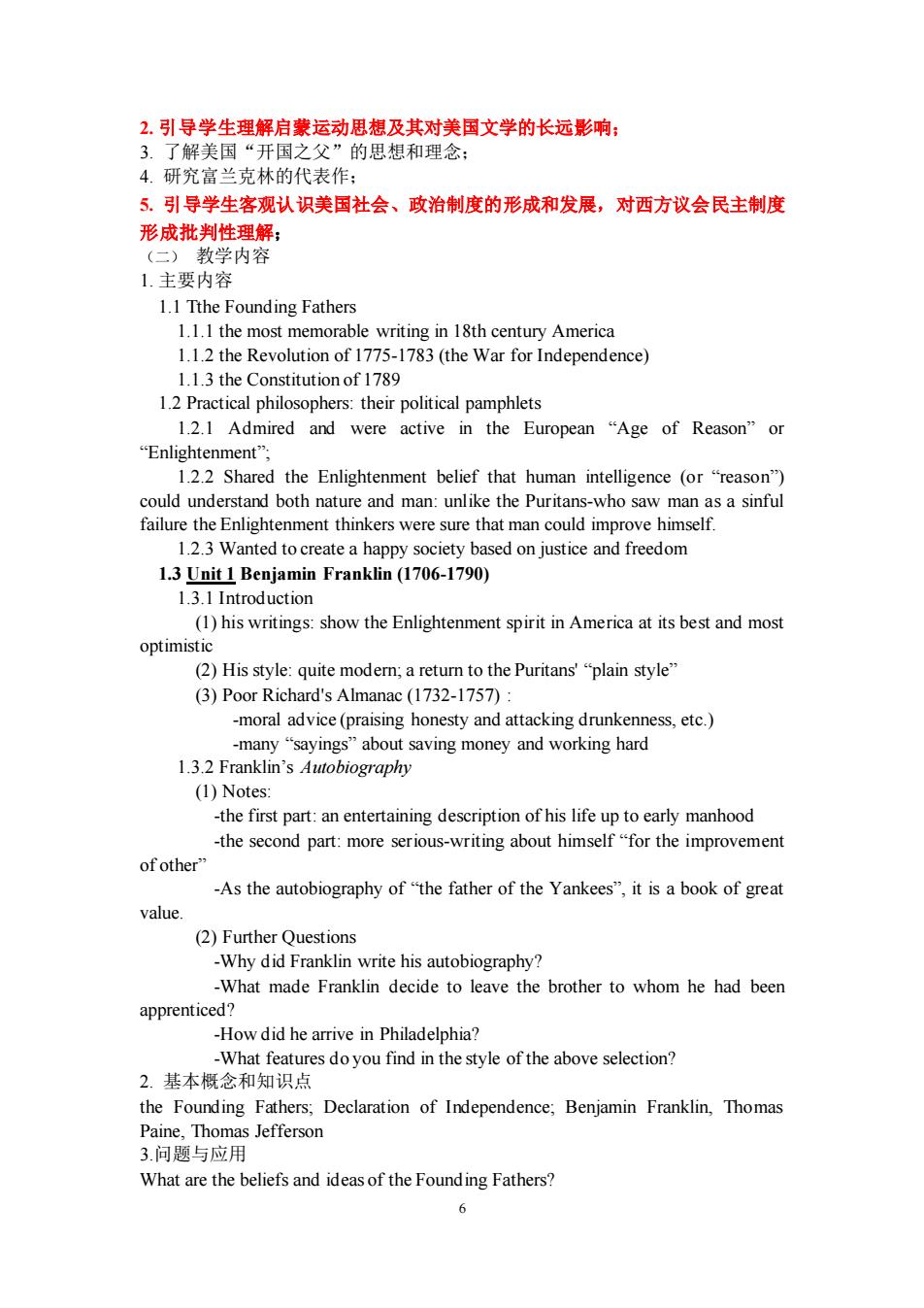正在加载图片...

2.引导学生理解启蒙运动思想及其对美国文学的长远影响 . 了解美国 开国之父”的思想和理念: 4.研究富兰克林的代表作: 5.引导学生客观认识类国社会、政治制度的形成和发展,对西方议会民主制度 形成批判性理解: (二)教学内容 1.主要内容 1.1 Tthe Founding Fathers 1.1.1 the most memorable writing in 18th century America 1.1.2 the Revolution of 1775-1783(the War for Independence) 1.1.3 the Constitution of 1789 1.2 Practical philosophers:their political pamphlets 1.2.1 Admired and were active in the European "Age of Reason"or “Enlightenment, 1.2.2 Shared the Enlightenment belief that human intelligence (or "reason") could understand both nature and man:unlike the Puritans-who saw man as a sinful failure the Enlightenment thinkers were sure that man could improve himself. 1.2.3 Wanted to reate a happy s iety bas sed on justice nd freedom 1.3 Unit 1 Benjamin Franklin (1706-1790) 1.3.I Introduction (1)his writings:show the Enlightenment spirit in America at its best and most optimistic (2)His style:quite modem;a retum to the Puritans'plain style" (3)Poor Richard's Almanac(1732-1757) -moral advice(praising honesty and attacking drunkenness,etc.) many "sayings about saving money and working hard 1.3.2 Franklin's Autobiography (1)Notes: the first part:an entertaining description of his life uptoearly manhood -the second part:more serious-writing about himself "for the improvement of other -As the autobiography of"the father of the Yankees",it is a book of great value (②)Further Question -Why did Franklin write his autobiography? -What made Franklin decide to leave the brother to whom he had been apprenticed? -How did he arrive in philadelphia? What fea esdoyou find in the style of the above selection? 2.基本概念和知识 the Founding Fathers;Declaration of Independence;Benjamin Franklin,Thomas Paine,Thomas Jefferson 3.问题与应用 What are the beliefs and ideas of the Founding Fathers? 66 2. 引导学生理解启蒙运动思想及其对美国文学的长远影响; 3. 了解美国“开国之父”的思想和理念; 4. 研究富兰克林的代表作; 5. 引导学生客观认识美国社会、政治制度的形成和发展,对西方议会民主制度 形成批判性理解; (二) 教学内容 1. 主要内容 1.1 Tthe Founding Fathers 1.1.1 the most memorable writing in 18th century America 1.1.2 the Revolution of 1775-1783 (the War for Independence) 1.1.3 the Constitution of 1789 1.2 Practical philosophers: their political pamphlets 1.2.1 Admired and were active in the European “Age of Reason” or “Enlightenment”; 1.2.2 Shared the Enlightenment belief that human intelligence (or “reason”) could understand both nature and man: unlike the Puritans-who saw man as a sinful failure the Enlightenment thinkers were sure that man could improve himself. 1.2.3 Wanted to create a happy society based on justice and freedom 1.3 Unit 1 Benjamin Franklin (1706-1790) 1.3.1 Introduction (1) his writings: show the Enlightenment spirit in America at its best and most optimistic (2) His style: quite modern; a return to the Puritans' “plain style” (3) Poor Richard's Almanac (1732-1757) : -moral advice (praising honesty and attacking drunkenness, etc.) -many “sayings” about saving money and working hard 1.3.2 Franklin’s Autobiography (1) Notes: -the first part: an entertaining description of his life up to early manhood -the second part: more serious-writing about himself “for the improvement of other” -As the autobiography of “the father of the Yankees”, it is a book of great value. (2) Further Questions -Why did Franklin write his autobiography? -What made Franklin decide to leave the brother to whom he had been apprenticed? -How did he arrive in Philadelphia? -What features do you find in the style of the above selection? 2. 基本概念和知识点 the Founding Fathers; Declaration of Independence; Benjamin Franklin, Thomas Paine, Thomas Jefferson 3.问题与应用 What are the beliefs and ideas of the Founding Fathers?